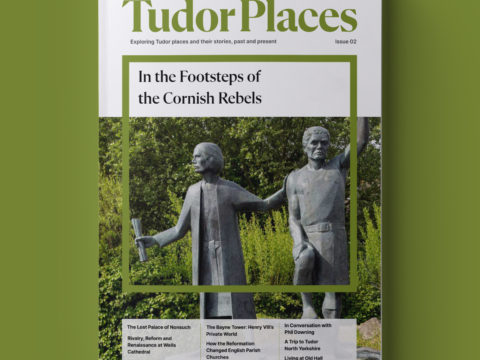Thomas More: Life Story
Chapter 17 : Act of Succession
At last, in 1533, Pope Clement pronounced on the annulment. Henry’s marriage to Katharine was valid, and he should dismiss Anne and return to his wife, on pain of excommunication. Henry was livid and his wrath found expression in the arrest of Elizabeth Barton and those who had been her accomplices. On the scaffold Barton, who had been subject to who-knows-what torments, admitted to being a fraud.
Soon after, a bill was drawn up which sought to attaint people connected with Barton, and amongst the names were Fisher’s and More’s. An Act of Attainder, if passed, could result in an execution or imprisonment and confiscation without trial. More protested his innocence of any treasonous involvement with Barton in a letter to Cromwell. He and Cromwell met in person. Cromwell pressed More, on behalf of Henry, to write in favour of the annulment, but all that More would say was that he would not discuss the matter – he never had, and he never would. Cromwell put the charges of conspiring with Elizabeth Barton to him, which More vehemently denied. Cromwell advised Henry to drop More’s name from the Bill, for lack of substantial evidence, but the King refused.
Following this, More was interrogated for the first time by a sub-set of the Council, which included Cromwell, Archbishop Cranmer, and his own replacement as Lord Chancellor, Thomas Audley. They pushed him to comment on Henry’s new marriage, but again, all he would say was that he had given his opinion to the King, and would not repeat it. He laughed off their threats of severe punishment as empty threats, that might frighten children, but that could not affect him.
As for Papal Supremacy, he had been in two minds about the matter until he had read Henry’s own book, which had convinced him of it. At all events, he asked the Councillors to assure Henry of his continuing loyalty.
Not all of Henry’s Lords were quite so supine as to ignore the treatment of a man who had been one of their number. A paper was sent to Henry, suggesting that it would be more appropriate for More and the others named in the Bill to be called before the Lords in Parliament to defend themselves, rather than being attainted. Henry initially refused and insisted that More’s name should remain in the Bill. Warned that the Bill might not be passed, he threatened to attend Parliament in person to browbeat the Lords into submission.
Henry’s councillors were horrified at this idea – they had a pretty shrewd idea that the Bill would not be passed with More’s and Fisher’s names in it, and they pointed out to Henry that if he were refused in person it would greatly damage his authority. Audley added the rider that there would undoubtedly be some other occasion for punishing More.
The Duke of Norfolk, with whom More had worked for many years, and who probably shared his views about Papal Supremacy, and possibly even the marriage of Henry and Anne, although she was his niece, visited More to persuade him to comply. According to Roper’s biography the Duke exclaimed:
‘By the Mass, Master More, it is perilous striving with princes. And therefore I would wish you somewhat to incline to the King’s pleasure. For by God’s Body, Master More, the wrath of princes is death.’
‘Is that all, my Lord,’ More replied. ‘Then in good faith is there no more difference between your grace and me, but that I shall die today and you tomorrow.’
Henry was determined to have his way. Not just with More, but with everyone who opposed him. Queen Anne had given birth in September 1533, to a daughter, Elizabeth. This was a disappointment to the King, who had counted on a son, but nevertheless, he pressed on with his plans. A Bill was introduced to the House of Lords. Called the Act of Succession, it stated that Henry’s marriage to Katharine of Aragon had been void from the start, and subsequently annulled. No marriages of that sort could ever be legal, and could not be sanctioned by any power. This effectively nullified Papal rights of dispensation.
The succession to the throne was settled on the children of Henry and Anne. If the Bill were passed, it would be an offence to insult the King, the Queen or their children, or to support or protect anyone who did. All subjects were to be obliged to swear an oath to uphold the whole Act.
If this Act were to be passed, fifteen hundred years of Papal Supremacy in England would be swept away. Many people were unhappy about this, but unable or unwilling to resist; a few were delighted, but the vast majority were probably indifferent. Papal authority did not affect day to day doctrines of religion, which were undisturbed by the Act, although the payment of annates was now banned, and, relevant to Katharine of Aragon, appeals to the Pope from English ecclesiastical authority, embodied in Cranmer, were forbidden.
For More, it was the thin end of the wedge. As soon as Papal authority was overthrown, it would allow the chipping away of the ancient, universal Church, built on custom and tradition, as well as Scripture. It would break up the long communion of the faithful, both alive and dead, that had endured since the time of Christ Himself.
No longer in public office, he changed his writings from polemic against heresy to spiritual works such as ‘A Treatise on the Passion’, designed to comfort and strengthen both himself and others who might intend to resist Henry’s ever-increasing demands.



